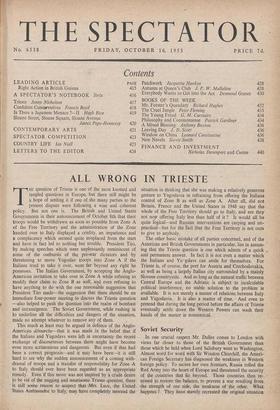ALL WRONG IN TRIESTE
F —also helped to push the question into the realm of bombast and intransigence. The Soviet Government, while rushing in to underline all the difficulties and dangers of the situation, made no attempt whatever to remove any of them. # This much at least may be argued in defence of the Anglo- American demarche—that it was made in the belief that if the Italians and Yugoslays were left in uncertainty the recent exchange of discourtesies between them might have become even more acrimonious and dangerous. But even if that had been a correct prognosis—and it may have been—it is still hard to see why the sudden announcement of a coming with- drawal of troops and a transfer of responsibility for Zone A to Italy should ever have been regarded as- an appropriate remedy. , Even if this move was not inspired by a crude desire to be rid.of the nagging and wearisome Trieste question, there , • Is still some reasOn to suspect that .Mrs. Luce, the United States Ambassador to Italy, may. have completely misread the situation in thinking that she was making a relatively generous gesture to Yugoslavia in refraining from offering the Italians control of Zone B as well 'as Zone A. After all, did not Britain, France and the United States in 1948 say that the whole of the Free Territory should go to Italy, and are they not noy, offering Italy less than half of it ? It would all be quite logical—and Russian interventions are carping and un- practical—but for the fact that the Free Territory is not ours to give to anybody.
The other basic mistake of all parties concerned, and of the American and British Governments in particular, lies in assum- ing that the Trieste question is one which admits of a quick and permanent answer. In fact it is not even a matter which the Italians and Yu' gslays can settle for themselves. For Trieste is, of course, the port for Austria and Czechoslovakia, as well as being a largely Italian city surrounded by a mainly Slovene countryside. And so long as the natural traffic between Central Europe and the Adriatic is subject to incalculable political interference, no stable solution to the problem is available. It is not merely a matter of relations between Italy and Yugoslavia.. It is also a matter of time. And even to pretend that during the long period before the affairs of Trieste eventually settle down the Western Powers can wash their hands of the matter is nonsensical.


































 Previous page
Previous page